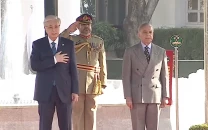IMF gets BISP allocation at Rs593 billion
Now there is a proposal to increase the number of beneficiaries in the range 9.6 million to 9.7 million people

The government may allocate a record Rs593 billion for the Benazir Income Support Programme in the next budget after the International Monetary Fund asked Islamabad to increase the number of beneficiaries and their compensation ahead of an inflationary storm.
The proposed allocation has been finalized in light of the discussions that took place with the IMF, according to the government sources. They said that the IMF was not satisfied with the initial indicative allocation of around Rs518 billion for the next fiscal year.
The Rs592.5 billion –to be precise – budget is Rs121 billion or 26% higher than the budget allocated for the outgoing fiscal year.
The BISP is the critical social safety net of Pakistan, which aims at lessening the impact of the inflation on Pakistan’s poorest segments of the society. These people are mostly impacted by the policies of the government and IMF.
Where the BISP helps lower the woes of the poorest segment of the society, the spending somehow ignores the suffering of the country’s lowest middle income groups that do not get any relief and are more hit by the policies of the IMF and the government. The IMF uses BISP as an excuse to deflect criticism over constant increase in the cost of utilities and the taxes for the majority of the people.
Pakistan is in the middle of finalizing a new programme with the IMF and the conditions that the IMF has asked to implement would make the lives of the ordinary people more miserable. The IMF new recipe requires Pakistan to withdraw the reduced sales tax rates and also end any sales tax exemptions, except meant for the exporters or where the country has binding foreign sovereign deals.
This would increase the prices of almost every important commodity being consumed at home and the durables being bought by the households.
Former Prime Minister Nawaz Sharif also said on Friday that the IMF conditions increase the hardships of the poor people.
The sources said that the proposed Rs593 billion allocation is aimed at both enhancing the cash compensation and adding more people in the list of the beneficiaries.
During the outgoing fiscal year, the government had added another 300,000 families into the Kafaalat unconditional cash transfer programme, bringing total enrollment to 9.3 million.
Now there is a proposal to increase the number of beneficiaries in the range 9.6 million to 9.7 million people in the next fiscal year on the back of the additional budget.
There is also a proposal to increase the quarterly compensation from the current level of Rs10,500 by least one-fifth. The new quarterly compensation might be in the range of Rs1,3000 per family. The existing compensation covers only 12% of the expenditures of the poorest family, which the IMF wants to be increased to at least 15% in the next budget, said the sources.
The IMF has been urging Pakistan to also restrict the electricity subsidies to the BISP beneficiaries. It is of the view that instead of providing subsidized electricity through electricity bills, Pakistan should pay the cash amounts to the needed families and end general electricity subsidies.
The IMF has also been pushing Pakistan every year to timely implement annual adjustments in the compensations to offset the impact of the inflation on the poorest segments. These adjustments are made in January every year, almost equal to prevailing average inflation rate in the previous fiscal year.
However, the last compensation was below the average inflation rate.
The IMF has also been advocating improving health and education outcomes and improving the quality of the BISP conditional cash transfer programmes. For this fiscal year, about one million families and 1.9 million children were enrolled into these health and education conditional programs.
Still about 25% children of the BISP beneficiaries remain out of schools.
Pakistan has a goal to increase the number of BISP beneficiaries to 20 million households. It is also negotiating two new loans with the World Bank worth 400 million for the BISP. These loans will be mostly spent under the conditional cash grant programmes to enhance the number of school going children and ensure their health benefits.
The BISP will now be the sixth single largest budget allocation after the allocations for the debt servicing, defense, development, pensions and the cost of running of the civil government.
However, the IMF has asked Pakistan to transfer the BISP spending to the provinces under the new National Finance Pact.



















COMMENTS
Comments are moderated and generally will be posted if they are on-topic and not abusive.
For more information, please see our Comments FAQ